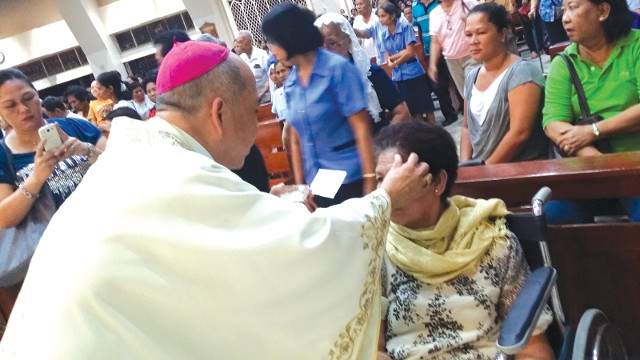
WORLD DAY OF THE SICK 2015: A Call to Serve
Bryan was 27 years old when he died. He was a victim of cerebral palsy. All his needs were provided in an orphanage which also takes indigent patients like him. He was totally dependent on others. When he died, one would wonder what his life was for. His life was spent on his cot 24/7. Did he have any contribution to society? Perhaps one would say none. That is, when you look externally. But beyond the peripheral, he may have accomplished his life purpose.
Ellen was her caregiver in the facility. She travels everyday to work from Montalban, Rizal to Quiapo, leaving home early in the morning and arriving home late in the evening. She admits that if not for her love of service, she may have succumbed to the stressful demands on her time and strength. When she is away from her wards she misses them. She says she does not wish wealth for herself as her needs are taken cared of and her wants are more than compensated from the fulfillment she gets in serving her wards. She had 5 cases in the facility including Bryan.
Who serves who? Bryan was the patient but he brought out the best in Ellen. He had given Ellen the chance to become a saint.
February 11 is World Day of the Sick, an observation introduced by Pope John Paul II as all believers seek for “a special time of prayer and sharing, of offering one’s suffering for the good of the Church and of reminding everyone to see in his sick brother or sister the face of Christ who, by suffering, dying and rising, achieved the salvation of mankind” (Letter Instituting the World Day of the Sick, 13 May 1992, n. 3). The day coincides with the commemoration of Our Lady of Lourdes.
His Holiness Pope Francis’ in his Message for the 23rd World Day of the Sick says that “this year’s theme invites us to reflect on a phrase from the Book of Job: ‘I was eyes to the blind, feet for the lame’ (Job 29:15).” He addressed his Message not only to those who are ill but the professionals and volunteers in the field of the health care as well, to reflect on the wisdom of the heart. This wisdom, he says “is no theoretical, abstract knowledge, the product of reasoning. Rather, it is, as Saint James describes it in his Letter, ‘pure, then peaceable, gentle, open to reason, full of mercy and good fruits, without uncertainty or insincerity’ (3:17). He further explains that it is ”a way of seeing things infused by the Holy Spirit in the minds and the hearts of those who are sensitive to the sufferings of their brothers and sisters and who can see in them the image of God.”
Ellen finds value in serving persons with cerebral palsy, particularly those who could no longer take care of themselves and whose families could not provide such special care because of poverty. She, too, cried when Bryan died not for his passing but for the great opportunity he had given her to serve. It was like what Pope Francis asked during an encounter with the youth in his recent visit to the country. “You…help others but do you allow yourselves to receive?” Ellen has received much that is why she cried.
In his Message, Pope Francis says “it is relatively easy to help someone for a few days but it is difficult to look after a person for months or even years, in some cases when he or she is no longer capable of expressing gratitude.” Bryan was no relation to Ellen. It must be challenging to serve him for he could not even communicate. Yet Ellen served him with love. This is surely an example of what Pope Francis says “What a great path of sanctification this is!”
The facility where Ellen serves has another ward. His name is Luisito. He was 23 when this writer had an apostolate there. He is an autistic person. He does not communicate except a little mumble to himself. But come bath time for the mentally ill patient, he stood by ready for any summons from Ellen. His task is to hand the bathing items and clothes. Even with his condition he still strives to serve. Even the poor have something to give. Pope Francis in that same Encounter with the Youth says “…learn to be evangelized by the poor, by those we help, the sick, orphans; they have so much to give us.”
The time spent with the sick is holy time says Pope Francis. Do we notice what we do or say when we visit a sick person whether family or friend? Sick people can be quite sensitive. When they cry or complain, are our own complaints louder than theirs? What do sick people need? Does our presence give them peace? When they cry for help (whether expressed in words or tears) are we their eyes or feet?
Bryan was a patient but he was also a teacher. He taught Ellen the true meaning of service. Bryan was a poor disabled man but he gave Ellen his treasure: the strength to endure his difficult life that Ellen may become a saint. Ellen’s selfless service echoes this year’s theme: “I was eyes to the blind, and feet to the lame” (Job 29:15). Ellen was Bryan’s eyes and feet for she saw to his needs.
The example of Bryan and Ellen can serve as a new way of looking at an illness. Whether one is the patient or the caregiver, the call is the same: It is an opportunity “to release love, in order to give birth to works of love towards neighbor, in order to transform the whole of human civilization into a civilization of love” (Apostolic Letter Salvifici doloris, n. 30). (Nena Quijano)


No Comments